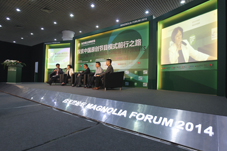【Magnolia Forum】Rapidly rising demand drives need for creative new TV show formats

The comment was made in the forum\'s first session by Leng Song, secretary-general of China Media Research Center.
“Twenty percent of the audience is watching 80 percent of the shows,” Leng told invited TV industry decision makers and project leaders gathered to discuss the development of original Chinese TV formats.
China has seen a boom in producing various TV shows. Imported and localized productions like Where Are We Going, Dad? and I am a Singer have not only dominated the screens but also kept breaking ratings records.
The rapid expansion not only brought vast opportunities for Chinese television channels, but also raised concerns.
China Television Arts Committee director and secretary-general Wang Danyan told the forum the phenomenon was the result of unprecedented demand for creative TV shows.
Occasionally there are shows that follow the same path, but overall the quality of TV shows is improving, she said.“The most important thing is for media elites and leaders to be more intelligent in their creative endeavors,” Wang added.
Ma Dong, chief content officer of popular video site iQiyi and director of the show Chinese Spelling Hero, said the Chinese TV industry has a very high level of marketization but lacks an elimination strategy to protect the market.
He also explained that China is developing so fast that the generations are detached and each generation has its own interests.
“Shows need to be eye-catching formats as well as grasp people’s heartstrings,” Ma said.
Chinese Spelling Hero is the first game show in China that centers on the writing of Chinese characters, an original production that is rooted in traditional Chinese culture and has a format intended for overseas export.
“I really like shows that express traditional culture, and we are seeing more of these in recent years,” Wang said.
Liu Xichen, CEO of 3C Media, has been importing TV show formats for almost a decade and the business has grown and matured significantly.
“Over the years TV formats have achieved significant results in China\'s television industry. The channels are now accustomed to buying the formats (instead of just stealing and copying),” Liu said.
Though a format is different from a creative idea, a format is the comprehensive and systemic bible of how to produce and distribute a show, he said.
Many producers have been working with South Korean TV channels and production teams. Where Are We Going, Dad? and I am a Singer are both imported from MBC while SBS’s Running Man will be produced in China in the near future.
“South Korea used to import shows from Europe and America. I think this model is also the starting point," said Park Joong Min, managing director of KBS\'s content planning division.
"What’s more important than importing is the analysis and understanding of the formats,” he added.



